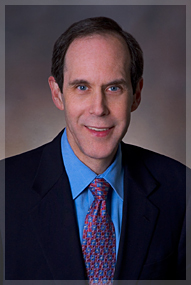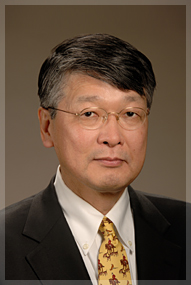The 2007 Keio Medical Science Prize Awardees
Brian J. Druker, M.D.

Investigator, Howard Hughes Medical Institute
Director, Oregon Health & Science University Cancer Institute
JELD-WEN Chair of Leukemia Research
Reason for Selection and his Major Achievement:
For the development of a molecular-targeted therapy for chronic myelogenous leukemia
Chronic myelogenous leukemia (CML) is caused by the BCR/ABL tyrosine kinase. This fusion protein is generated from a chromosomal translocation called the "Philadelphia chromosome". Toxic therapies, such as an allogeneic stem cell transplant have been the only available curative therapy. Dr. Brian Druker, in collaboration with researchers at a pharmaceutical company, has developed a low-molecular-weight inhibitor of the ABL tyrosine kinase, called imatinib (Gleevec®). As a researcher and practicing oncologist, his extensive knowledge of tyrosine kinases and CML afforded him a unique ability to spearhead critical pre-clinical and clinical studies of this drug. imatinib is now known to be effective not only for CML, but also for other types of cancer, including GIST (gastrointestinal stromal tumor). The successful development of imatinib, which is orally administered and does not produce severe adverse effects, has revolutionized cancer therapy. It has spurred the era of molecular-targeted therapy, in which drugs are targeted at specific molecules predicted by basic cancer research, replacing conventional, non-specific anti-cancer dugs. The Keio University Medical Science Fund would like to congratulate Dr. Druker on his innovative accomplishment in establishing a new paradigm for the treatment of cancer by presenting him with the 2007 Keio Medical Science Prize.
Background
- 1977
- B.A., University of California, San Diego, CA
- 1981
- M.D., University of California School of Medicine, San Diego, CA
- 1981
- Internship and Residency in Internal Medicine
Barnes Hospital, Washington University School of Medicine, St. Louis, MO - 1984
- Fellowship in Medical Oncology
Dana-Farber Cancer Institute, Harvard Medical School, Boston, MA - 1987
- Instructor in Medicine
Harvard Medical School, Boston, MA
Clinical Associate
Dana-Farber Cancer Institute, Boston, MA
Associate Physician
Brigham and Women's Hospital, Boston, MA
Medical Director
Nashoba Community Hospital, Oncology Clinic, Ayer, MA - 1993
- Staff Physician
University Hospital and Clinics, OHSU - 1993
- Associate Professor
Department of Medicine, Oregon Health & Science University (OHSU) - 1993
- Co-Director
Center for Hematologic Malignancies, OHSU Cancer Institute - 1993
- Joint Appointment
Department of Cell and Developmental Biology, OHSU - 1993
- Program Leader
Hematologic Malignancies, OHSU Cancer Institute - 1996
- Joint Appointment
Department of Biochemistry and Molecular Biology, OHSU - 1996
- Director / Associate Director
OHSU MD/PhD Program - 2000
- Professor of Medicine
Division of Hematology & Medical Oncology, OHSU - 2002
- Investigator
Howard Hughes Medical Institute - 2007
- Director
OHCU Cancer Institute - 2007
- Interim Chief
Division of Hematology & Medical Oncology:Hematologic Malignancies
Hiroaki Mitsuya, M.D., Ph.D.

Professor, Department of Hematology, Department of Rheumatology and Clinical Immunology, Division of Infections Diseases, Graduate School of Medical and Pharmaceutical Sciences, Kumamoto University
Chief and Principal Investigator, Experimental Retrovirology Section Center for Cancer Research National Cancer Institute
Reason for Selection and his Major Achievement:
For the development of anti-AIDS drugs
Acquired immune deficiency syndrome or AIDS, caused by the human immunodeficiency virus (HIV), appeared suddenly toward the end of the last century and has had an enormous negative impact on the society, generating tremendous fear and loss. In 1984, Dr. Hiroaki Mitsuya, despite great risk, attempted to develop anti-HIV drugs targeting the retroviral reverse transcriptase using human CD4-positive helper T cell lines that he generated in Dr. Samuel Broder's laboratory at the National Cancer Institute, National Institutes of Health in the United States. In 1985, Dr. Mitsuya discovered that AZT exhibits potent HIV-inhibiting activity, and ultimately developed it as the world's first AIDS drug. He subsequently developed ddI and ddC as additional AIDS drugs, and has recently succeeded in developing a new protease inhibitor that is effective in refractory AIDS patients. These AIDS drugs have been used in clinics around the world, and have dramatically improved the prognosis of HIV-infected individuals. Dr. Mitsuya's discovery is highly regarded as a clinical breakthrough in the fight against AIDS. His revolutionary research has made Dr. Mitsuya a world expert in the area of anti-HIV drug development. The Keio University Medical Science Fund is very pleased to admire Dr. Mitsuya's achievement by presenting him with the 2007 Keio Medical Science Prize.
Background
- 1975
- M.D. Kumamoto University School of Medicine
- 1980
- Instructor, Department of Internal Medicine II, Kumamoto University School of Medicine
- 1982
- Received a Ph.D. degree (Doctor of Medical Science) from Kumamoto University School of Medicine
- 1982
- Visiting Fellow, National Cancer Institute
- 1984
- Cancer Expert, Clinical Oncology Program, National Cancer Institute
- 1988
- Visiting Scientist, Clinical Oncology Program, National Cancer Institute
- 1989
- Senior Investigator, Clinical Oncology Program, National Cancer Institute
- 1991
- Chief, Experimental Retrovirology Section, Medicine Branch, National Cancer Institute
- 1997
- Professor of Medicine and Chairman, Department of Hematology, Department of Infectious Diseases, Kumamoto University School of Medicine
- 1997
- Principal Investigator & Chief, Experimental Retrovirology Section, Medicine Branch, National Cancer Institute
- 1999
- Director, Center for Clinical Trials, University Hospital, National Kumamoto University School of Medicine
- 2000
- Director, Department of Infectious Diseases, University Hospital, National Kumamoto University School of Medicine
- 2000
- Vice-Director, University Hospital, National Kumamoto University School of Medicine
- 2001
- Principal Investigator & Chief, Experimental Retrovirology Section, HIV and AIDS Malignancy Branch, National Cancer Institute
- 2003
- Visiting Professor, Institute for Virus Research, Kyoto University
